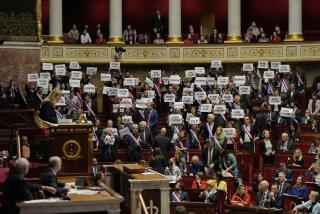TURMOIL IN JAPAN : Miyazawa’s Setback Helps Japanese Exporters : Trade: The Parliament’s no-confidence vote is a blow, but it provides a brief respite from losses due to the strong yen.
- Share via
TOKYO — Passage of a no-confidence motion against Prime Minister Kiichi Miyazawa dealt another blow to business confidence already undermined by two years of economic sluggishness. But, ironically, it provided a dose of medicine for one headache of Japanese executives.
Reacting to prospects for political instability, the yen--which had gained 18% in value since the beginning of the year--performed an about-face on foreign exchange markets in the United States and Europe in the wake of Miyazawa’s stunning defeat on Friday.
Immediately after the motion passed, the dollar--which had fallen to a post-World War II low at the 104-yen level earlier in the week--shot back up to above 110 yen at one point in trading on the New York Foreign Exchange Market. In Tokyo today, the dollar climbed to 110.50 in morning trading. The one-week gain added nearly 6 yen worth of extra profits for each $1 worth of exports produced by Japanese manufacturers.
As a result, exporters, who had been receiving 125 yen for each dollar’s worth of overseas shipments at the beginning of the year, will receive at least a temporary respite in the relentless attack on their profits that has been depressing corporate investment.
Yoshiro Mori, minister of International Trade and Industry, nonetheless said he was concerned that the “political vacuum will depress business sentiment and could delay recovery in the still fragile economy.”
He also said he feared political instability could effect Miyazawa’s ability to chair the economic summit of seven industrial democracies that will be held in Tokyo July 7-9. President Clinton and the leaders of Canada, Britain, France, Germany and Italy will attend.
Takeshi Nagano, chairman of Nikkeiren (Federation of Employers Assns.), branded as “intolerable” the political vacuum he said would be created by the snap election July 18. He cited Japan’s position as host for the economic summit and a need to cope with the prolonged economic slump and the yen’s rapid rise.
Taro Kaneko, chairman of Marusan Securities, said Japan’s solid bureaucracy ensures that the political vacuum will create no problems. But Yukio Aida, chairman of Nomura Securities, said new economic measures to spur the economy are still needed.
Yoshiaki Sakakura, president of Mitsukoshi Department Stores, said political instability already has driven down stock prices and will continue to exert a negative influence on the economy.
None of the business leaders mentioned it, but the vacuum and potential instability promise to be particularly severe.
Never before have the Liberal Democrats, who have controlled the government since 1955, gone into a lower house election with the party falling apart. Eleven incumbents already have walked out to protest Miyazawa’s failure to implement political reform, and 35 others--led by former Finance Minister Tsutomu Hata and former party secretary Ichiro Ozawa--were poised to form their own new party this week.
In the last lower house election in February, 1990, the Liberal Democrats won a majority of 34 seats. But with the defections, the party would go into the campaign at least 23 seats below a majority--an unprecedentedly ominous sign.
On Friday morning, before the Hata-Ozawa rebels joined the opposition to pass the no-confidence motion, the Economic Planning Agency reported that Japan’s economy in fiscal 1992 grew by only 0.8%--the lowest since 1974, when the GNP declined by 0.2%.
An upsurge of 0.6% real growth between January and March--2.3% at an annual rate--that offered a prospect for an improved fiscal 1993 was endangered, however, by the yen’s appreciation eating into corporate profits, said Shunji Fukinbara, vice minister of the agency. The impact of yen appreciation, he said, was expected to show up in statistics for the April-June period.
Japan’s burgeoning surplus in current accounts--the total of both trade and non-trade transactions such as insurance, freight and tourism--climbed to 3.7% of the GNP between January and March, up from 3.3% during the last three months of 1992.
More to Read
Sign up for Essential California
The most important California stories and recommendations in your inbox every morning.
You may occasionally receive promotional content from the Los Angeles Times.













